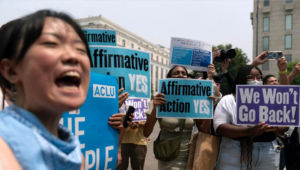He has expressed strong disagreement with the ruling, highlighting the importance of affirmative action in promoting equal opportunities and addressing historical disparities. Justice Jackson argues that ending affirmative action could perpetuate systemic inequalities and hinder progress towards a more equitable society. His dissent underscores the ongoing debate surrounding the role of affirmative action and its impact on diversity and inclusion in various spheres, including education and employment.

The Supreme Court’s conservative majority overturned decades of precedent by issuing a pair of opinions that prohibit the use of race in college admissions. The decisions elicited strong dissent from Justice Ketanji Brown Jackson, who wrote a scathing rebuke in one of the decisions involving the University of North Carolina. She criticized the majority’s “colorblindness for all” approach, emphasizing that deeming race irrelevant in law does not erase its significance in life and the real-world problems faced by institutions of higher learning.
In her dissent, Jackson traced the history of systemic racism, highlighting the government’s establishment and continued operation with a preference for white citizens. She argued that past preferences and discriminatory policies have led to persistent race-based harms that still exist today. Jackson emphasized that the race-based gaps in society can be traced back to historical injustices and denied opportunities for Black Americans.
The cases at issue involved lawsuits against Harvard University and UNC, with claims that admissions policies discriminated against Asian American applicants. The schools defended their use of race as one of several factors in admissions decisions, aiming to increase diversity and level the playing field for historically disadvantaged populations. The court split along ideological lines, with a 6-2 ruling against Harvard and a 6-3 ruling against UNC.
Chief Justice John Roberts, writing for the majority, concluded that the admissions policies violated the Equal Protection Clause by lacking measurable objectives, employing race in a negative manner, and involving racial stereotyping without clear endpoints. The decisions come at a time when the country is grappling with divisions over systemic racism and as higher education institutions face challenges in expanding access to students of color after the pandemic.
The dissent from Justice Jackson, echoing concerns from various stakeholders, including lawmakers, civil rights groups, and education advocates, underscores the magnitude of the decisions and the potential implications for equal opportunity in education. The Congressional Black Caucus expressed strong opposition to the decisions and pledged to push back against attempts to use them as a divisive cultural wedge issue
